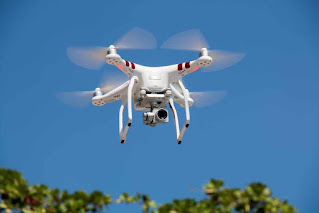Evidence Collected From Drone Disallowed by Court
Yes, drones have become ubiquitous. In Texas, they shoot them down like game birds. Cases are now starting to percolate into the common law of Michigan that examine the relationship between evidence obtained from invasive devices like drones, and our privacy.
The Michigan Court of Appeals recently decided Long Lake Township v Maxon, an interesting case pitting evidence gathered by a drone against a couple's right to privacy on their own property. The Township cited the couple for an ordinance violation; the Township was informed relative to the Maxon's alleged zoning ordinance violation via drone surveillance footage; the drone footage was obtained without a warrant.
The Maxons have a long history of litigation with Long Lake Township in Grand Traverse County over the Township's nuisance ordinance banning certain forms of salvage and junk operations. A settlement agreement had been governing relations between the parties since 2008, and prevented the Township from filing a violation against the homeowners.
In 2018, however, the Township complained that the Maxons had expanded their salvage operation over the past decade. To prove their contention, they hired Zero Gravity Aerial to make photographic drone flights directly over the Maxon's property in the years 2010, 2016, 2017, and 2018.
Throughout these years, the Township did not secure a warrant for the drone flights. The evidence collected clearly indicated an increase in the number of junked cars on the property.
Citing their right to be free from government searches without a warrant based on probable cause, the Maxons moved to supress the evidence obtained from the drones. In denying their motion, the trial court judge ruled that the homeowners had no expectation of privacy in their yard based on the "fixed wing" doctrine; therefore, without a privacy interest, a warrant was not required and the evidence gathered from the Township drones could be used to prove their case.
If a party has a reasonable justifiable expectation of privacy under the circumstances of a particular case, then the government must obtain a search warrant based on probable cause to invade that private sector. If there is no reasonable expectation under the circumstances, then no warrant is required. Within the jurisprudence of probable cause, warrantless searches are presumptively disfavored by the courts. This case is interesting because it adds a drone surveillance component that was not present in earlier cases.
Michigan has a drone statute which states:
(1) A person shall not knowingly and intentionally operate an unmanned aircraft system to subject an individual to harassment. As used in this subsection, "harassment" means that term as defined in section 411h or 411i of the Michigan penal code, 1931 PA 328, MCL 750.411h and 750.411i.(2) A person shall not knowingly and intentionally operate an unmanned aircraft system within a distance that, if the person were to do so personally rather than through remote operation of an unmanned aircraft, would be a violation of a restraining order or other judicial order.(3) A person shall not knowingly and intentionally operate an unmanned aircraft system to violate section 539j of the Michigan penal code, 1931 PA 328, MCL 750.539j, or to otherwise capture photographs, video, or audio recordings of an individual in a manner that would invade the individual's reasonable expectation of privacy.(4) An individual who is required to register as a sex offender under the sex offenders registration act, 1994 PA 295, MCL 28.721 to 28.736, shall not operate an unmanned aircraft system to knowingly and intentionally follow, contact, or capture images of another individual, if the individual's sentence in a criminal case would prohibit the individual from following, contacting, or capturing the image of the other individual.
Long Lake v Maxon is one of the first cases to apply this statute to a proceeding. The Court of Appeals characterized the zoning ordinance proceeding as quasi-criminal given the state powers intersecting with private property. The appellate court conducts a tour de force of case law pertaining to our "expectation of privacy" within the Fourth Amendment search warrant context. Drones are distinguished from aircraft in the case; they are characterized as smaller, quieter and more discreet than fixed-wing manned aircraft.
The United States Supreme Court addressed these issues within the "aircraft" context and has opined that a property owner's reasonable expectation of privacy should not be, "at the mercy of advancing technology." The Court of Appeals agreed, holding:
We conclude that; much like the infrared imaging device discussed in Kyllo; low-altitude, unmanned, specifically-targeted drone surveillance of a private individual’s property is qualitatively different from the kinds of human-operated aircraft overflights permitted by Ciraolo and Riley. We conclude that drone surveillance of this nature intrudes into persons’ reasonable expectations of privacy, so such surveillance implicates the Fourth Amendment and is illegal without a warrant or a traditional exception to the warrant requirement.
Notably, the published opinion contains a dissent from Judge Karen Fort Hood. She concludes that, since the Township operated the drone flights over the property just like any other drone operator, then the property owners did not have an expectation of privacy.
Post #629
Labels: drone, Fourth Amendment, Long Lake Township v Maxon, Michigan Court of Appeals, privacy, probable cause, small unmanned aircraft, unmanned aerial vehicle, warrant, Zero Gravity Aerial
 RSS
RSS




0 Comments:
Post a Comment
Subscribe to Post Comments [Atom]
<< Home